BLOG
Telehouse launches liquid cooling lab at London data center
Telehouse has teamed up with four cooling technology vendors to launch a liquid cooling lab at its London data center. Liquid cooling technology from the quartet of firms - Accelsius, EkkoSense, JetCool, and Legrand - will be on display at Telehouse South, at the company’s London Docklands campus.
Liquid cooling technology from the quartet of firms - Accelsius, EkkoSense, JetCool, and Legrand - will be on display at Telehouse South, at the company’s London Docklands campus.
Accelsius will be showcasing its NeuCool platform, a two-phase, direct-to-chip cooling solution that uses a waterless, nonconductive refrigerant for heat removal. The deployment at Telehouse’s data center will include the Accelsius Thermal Simulation Rack, a system that replicates high-power servers, enabling users to control, monitor, and measure the cooling and computational performance delivered by NeuCool technology.
Meanwhile, JetCool, which was acquired by Flex last November, will provide its SmartPlate System direct-to-chip cooling system in the lab.
Legrand will install its USystems ColdLogikCL20 rear door heat exchanger, supporting over 90kW capacity per cabinet, while EkkoSense, which provides AI-powered data center optimization software, will deploy its innovative EkkoSim ‘what-if?’ scenario simulations, air-side and liquid-side monitoring sensors, and web-based EkkoSoft Critical 3D visualizations with analytics and AI-powered advisory, and anomaly detection tools to Telehouse’s liquid cooling lab.

DXN launches liquid-cooled data center module
DXN, an Australian manufacturer of containerized data centers, has launched a liquid-cooled module.
The company this week announced the launch of a high-performance computing (HPC) AI direct-to-chip liquid cooling pod.
The modules are available in 1MW or 2MW designs and can be connected to other modules up to 10MW or 20MW. The direct-to-chip cooling pods can support up to 100kW or 200kW per rack.
The modules are available in 1MW or 2MW designs and can be connected to other modules up to 10MW or 20MW. The direct-to-chip cooling pods can support up to 100kW or 200kW per rack.
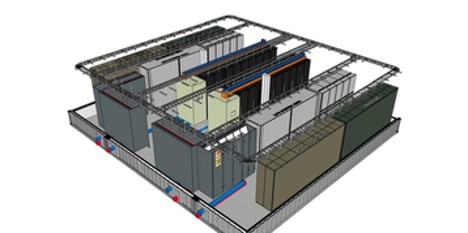
Advancing AALC Systems with Sidecar Cooling Solutions
In the realm of data center cooling technologies- the advancement and optimization of Air-Assisted Liquid Cooling (AALC) systems are pivotal.
AALC is a hybrid cooling technology that combines the efficiency of liquid cooling with the simplicity and widespread use of air cooling.
This method enhances cooling performance by using a liquid cooling system to remove heat from critical components- such as CPUs and GPUs- and then utilizing air cooling to dissipate that heat into the ambient environment.
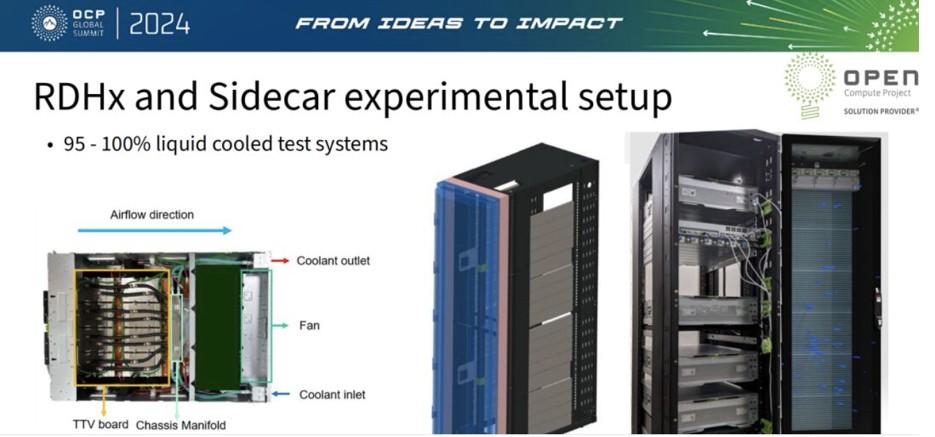
Trump announces a $500 billion AI infrastructure investment in the US
Three top tech firms on Tuesday announced that they will create a new company, called Stargate, to grow artificial intelligence infrastructure in the United States.
OpenAI CEO Sam Altman, SoftBank CEO Masayoshi Son and Oracle Chairman Larry Ellison appeared at the White House Tuesday afternoon alongside President Donald Trump to announce the company, which Trump called the “largest AI infrastructure project in history.”
The companies will invest $100 billion in the project to start, with plans to pour up to $500 billion into Stargate in the coming years. The project is expected to create 100,000 US jobs, Trump said.
Stargate will build “the physical and virtual infrastructure to power the next generation of AI,” including data centers around the country, Trump said. Ellison said the group’s first, 1 million-square foot data project is already under construction in Texas.
AI leaders have for months been sounding the alarm that more data centers — as well as the chips and electricity and water resources to run them — are needed to power their artificial intelligence ambitions in the coming years.

How small Chinese AI start-up DeepSeek shocked Silicon Valley
A small Chinese artificial intelligence lab stunned the world this week by revealing the technical recipe for its cutting-edge model, turning its reclusive leader into a national hero who has defied US attempts to stop China’s high-tech ambitions.
DeepSeek, founded by hedge fund manager Liang Wenfeng, released its R1 model on Monday, explaining in a detailed paper how to build a large language model on a bootstrapped budget that can automatically learn and improve itself without human supervision.
DeepSeek’s R1 release sparked a frenzied debate in Silicon Valley about whether better resourced US AI companies, including Meta and Anthropic, can defend their technical edge.
Liang’s status as an outsider in the AI field was an unexpected source of strength. At High-Flyer, he built a fortune by using AI and algorithms to identify patterns that could affect stock prices. His team became adept at using Nvidia chips to make money trading stocks. In 2023, he launched DeepSeek, announcing his intention to develop human-level AI.
After Washington banned Nvidia from exporting its most powerful chips to China, local AI companies have been forced to find innovative ways to maximise the computing power of a limited number of onshore chips — a problem Liang’s team already knew how to solve.
DeepSeek claimed it used just 2,048 Nvidia H800s and $5.6mn to train a model with 671bn parameters, a fraction of what OpenAI and Google spent to train comparably sized models.

Liquid cooling firm Iceotope announces new CEO
Liquid cooling firm Iceotope has named Jonathan Ballon as the company’s new CEO.
Announced this week, Ballon was most recently the president and CEO of SkyHive, a GenAI company that was acquired by Cornerstone in 2024. He has previously held roles at Intel (focused on AI and Edge computing), GE, Cisco, and others. He holds non-executive chairman roles at chip firms Axelera AI and Aspinity.
Iceotope was founded in 2005 and specializes in HPC computing, cooling, and modular data center infrastructure technologies. The company’s former CEO, David Craig, announced he was retiring in July.
Nathan Blom, chief commercial officer, and Simon Jesenko, chief financial officer, were jointly appointed interim CEOs in September until a permanent replacement was announced.
This week also saw Alain Andreoli appointed non-executive chairman. Andreoli was previously president and EVP of the Hybrid IT Group at HPE. Before that, he ran large businesses at Sun Microsystems, NTT, and Texas Instruments.

Department of Commerce signs four new CHIPS funding agreements
The US Department of Commerce has signed four separate non-binding preliminary memoranda of terms to award more than $246 million in CHIPS Act funding to four organizations.
Analog Devices, Coherent, Intelligent Epitaxy Technology, and Sumika Semiconductor Materials Texas are expected to be awarded $105 million, $79 million, $10.3 million, and $52.1 million, respectively.
According to the Department of Commerce, the funding will be used to support the expansion and modernization of two Analog Devices (ADI) manufacturing facilities in Chelmsford, Massachusetts, where the company has an R&D site and produces radio frequency and microwave systems.
ADI is also looking to expand and modernize two chip fabs in Beaverton, Oregon, and Camas, Washington, which could create up to an estimated 500 manufacturing and engineering jobs across all sites.
Of the total funding package, $300 million has been awarded to Absolics, Applied Materials, and Arizona State University to support advanced substrates and material research, with the remaining $1.1 billion awarded to Natcast to operate the advanced packaging capabilities of the CHIPS for America NSTC Prototyping and NAPMP Advanced Packaging Piloting Facility (PPF).
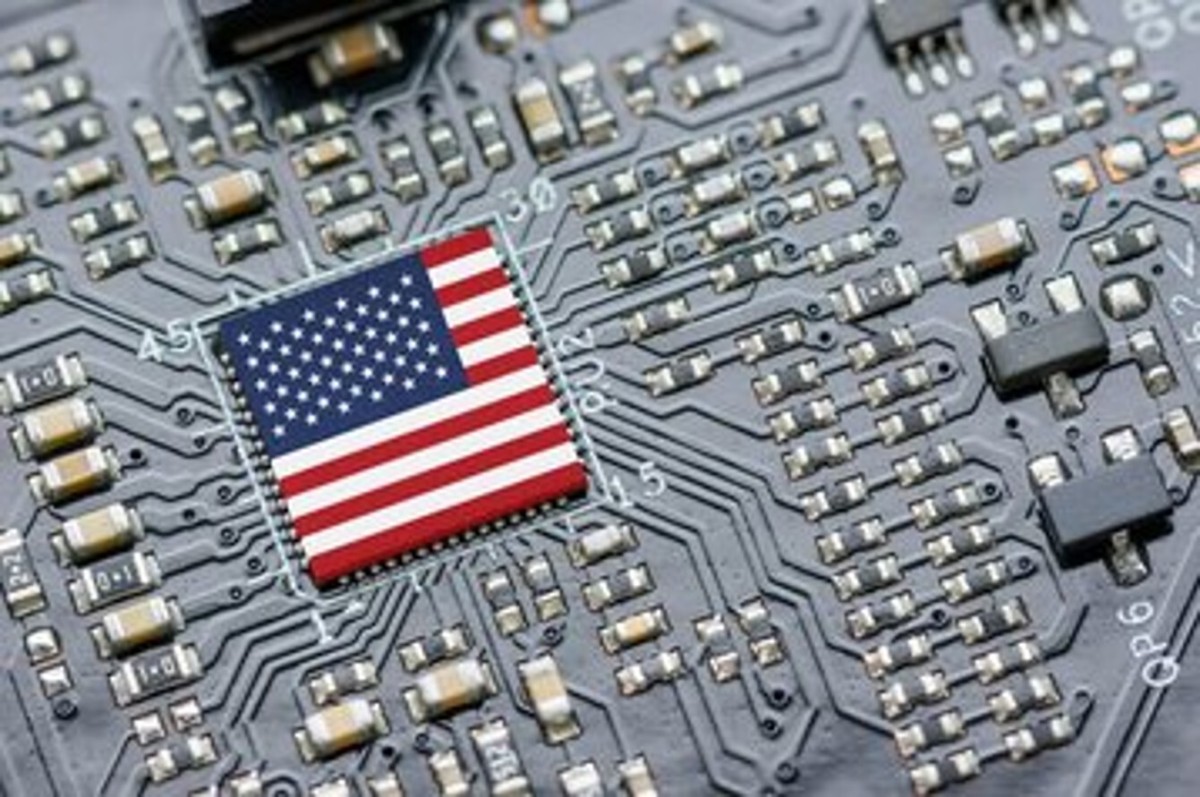
AI chip startup Blaize goes public via SPAC merger
AI chip startup Blaize has gone public on the Nasdaq in a SPAC deal.
The company this week merged with BurTech Acquisition Corp., owned by Burkhan World Investments.The deal valued Blaize at $1.2 billion and once closed, the chipmaker will have access to a $116 million convertible note and $36 million in additional funding.
Such mergers allow earlier-stage companies to go public sooner and more cheaply than going for a traditional float solo.The merger was further bolstered by an investment from the Sheikh Ahmed Dalmook Al Maktoum of the United Arab Emirates.
Founded in 2011 by former Intel engineers, to date Blaize has raised a total of $335 million from investors like Samsung and Mercedes-Benz. Headquartered in El Dorado Hills, California, the company manufactures AI chips for data center and Edge applications.
Blaize claims to have $400 million in deals in the pipeline, while TechCrunch reported that the company has signed a purchase order worth up to $104 million with an “unnamed EMEA defense entity.”
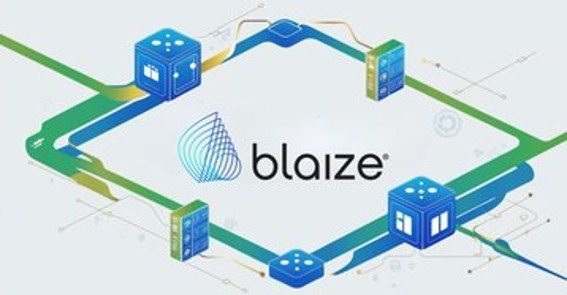
Meta plans expansion of Los Lunas data center campus in New Mexico
Social media giant Meta is looking to expand its data center campus in Los Lunas, New Mexico.
Meta, through its Greater Kudu LLC affiliate, intends to expand its existing data center campus at 4250 Messenger Loop NW, located outside Albuquerque.
The ‘next generation’ facilities are set to be able to support current products and enable future generations of AI hardware and related and similar facilities, according to the resolution.
Facebook broke ground on the campus in 2016, beginning with a single $250m facility built by Fortis. The company opened a third data center at Los Lunas in 2020 and announced another two-building expansion in 2021 that are set to go live this year. The site reportedly currently totals seven buildings, according to the News-Bulletin.
Meta paused development of around a dozen data centers in late 2022 as part of a "rescoping" of its designs to better cater for GPUs and liquid cooling. It has since resumed its build-out with the updated design.
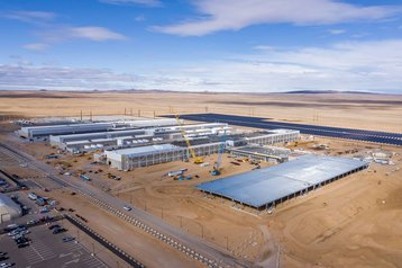
Data center M&A deals broke all records in 2024
Data center mergers and acquisitions (M&A) enjoyed a record year in 2024, new analysis has revealed. Data center mergers and acquisitions (M&A) enjoyed a record year in 2024, new analysis has revealed.
The biggest deals in 2024 included two separate equity investments in Vantage Data Centers, totaling a value of $9.2 billion. Vantage also received $3.1 billion equity investment in its EMEA operations.
The previous peak was in 2022, when deals worth $52 billion were closed. In contrast, 2023 saw a relative lull, with M&A activity dropping off to $26 billion.
Synergy's report attributes 2022’s peak to two “mega deals” in 2022, valued at $11 billion or more each. These deals were the acquisitions of CyrusOne and Switch, acquired in March and December of 2022 respectively.
The report added that aside from the rapid rise in overall M&A activity, the most notable feature is the flooding of private equity in the sector. Since 2021, private equity has accounted for between 80 to 90 percent of the value of closed deals.
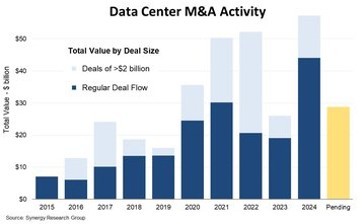
ColoCrossing launches LA1 facility in Los Angeles
ColoCrossing is offering space out of a Los Angeles facility in California.The company's LA1 data center at 1200 W 7th St, was launched at the end of last year with 22.5MW of capacity.
ColoCrossing said its data center “offers GPU compute-ready infrastructure, making it the perfect environment for businesses requiring powerful computing resources.”
It also offers connections to interconnection points such as One Wilshire and 600 W 7th St.
John Biloh, general manager at ColoCrossing, told local press: “The launch of our new data center is a milestone for ColoCrossing and our clients. With this facility, we’re not only enhancing our presence on the West Coast but also providing a state-of-the-art environment for businesses that require powerful and reliable hosting solutions. This expansion underscores our commitment to empowering our clients with the infrastructure they need to grow.”
Founded in 2003 and part of the HostPapa Inc. companies, ColoCrossing provides Internet-based services and colocation offerings. The company owns and operates its own data center in Buffalo, New York, and has other facilities in Georgia, Illinois, New Jersey, and Texas in the US, and one facility in Dublin, Ireland.

HPE inks $1bn server deal with social media platform X
HPE has signed a deal with X, formally Twitter, to provide the social media platform with $1 billion worth of AI servers.
According to a report from Bloomberg, the deal was finalized in late 2024, with HPE beating Dell and Supermicro for the contract.
While no information about the GPUs HPE will be providing X with has been made known, it’s likely to be Nvidia hardware. In June 2024, HPE added support for Nvidia’s latest GPUs and CPUs, with the company announcing its HPE Cray XD670 and the HPE ProLiant DL384 Gen12 servers would offer support for eight Nvidia H200 NVL Tensor Core GPUs.
At that time, HPE also said its hardware would be able to support the Nvidia GB200 NVL72/NVL2 and the incoming Blackwell, Rubin, and Vera architectures when they are made available.
Prior to Musk’s purchase of X in April 2022, the company relied on custom servers purchased from the likes of MiTAC (Tyan), Supermicro, and Wiwynn. However, in an apparent effort to reduce its expenses after the takeover, X stopped allegedly paying for server parts.
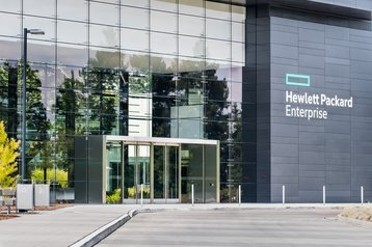
Amazon wants to add 322 acres to planned tech park in Spotsylvania County, Virginia
Amazon Web Services (AWS) has filed to add 322 acres to its planned tech park in Spotsylvania County, Virginia.
According to an application filed with the US Army Corps of Engineers (USACE) district in Norfolk, Virginia, AWS is planning a 322-acre campus just west of Massaponax Church Road.
The tech giant first submitted plans for Phase I of the campus in June 2023, proposing two 250,000 sq ft (23,225 sqm) data centers and a substation.
At the same time, AWS filed for three other data center campuses in Spotsylvania County, all totaling more than 10 million sq ft (929,000 sqm) of development.
Loudoun and Fairfax Counties have traditionally been Virginia’s data center hub. As available land and power have become harder to come by, many developers are expanding into Prince William County.
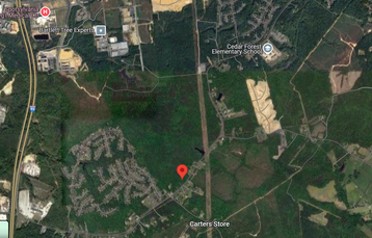
Nvidia-occupied data center up for sale in Silicon Valley, California
An Nvidia-occupied office and data center is up for sale in San Jose, California.
The property is described as a three-story powered shell data center and lab facility, fully occupied by Nvidia on an NNN lease through to September 2035.
Sat on 4.86 acres, the 100,325 sq ft (9,320 sqm) building was constructed in 2000 and renovated in 2020. It offers 8.5MW of utility power.
Nvidia, which supplies the GPU hardware fueling the current AI boom, has developed several of its own supercomputers, placed in Nvidia-operated or partner facilities globally.
A 2023 report suggested the company was seeking to expand its data center footprint to support its cloud services and offer it more directly.
In its May 2024 earnings report, Nvidia said it had committed to spend at least $9 billion on cloud computing services (including DGX Cloud) over the next few years.
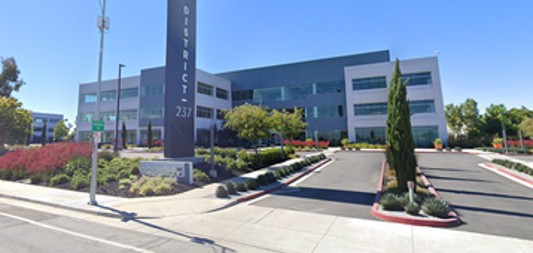
XTX Markets to build data center campus in Kajaani, Finland
Trading firm XTX Markets is to build its own data center in Finland.
The company this week announced plans to invest more than €1 billion ($1.04bn) to develop a 478-acre data center complex in Kajaani, in Finland’s Kainuu region.
The firm has begun construction on its first data center, with completion planned for 2026. The 15,000 sqm (161,460 sq ft) facility will total 22.5MW of IT capacity across three data halls.
The site will house infrastructure for XTX’s machine learning technology, which is used to analyze large amounts of data and produce price forecasts for financial instruments.
XTX Markets is an algorithmic trading firm, relying on machine learning to produce price forecasts for more than 50,000 financial instruments across equities, fixed income, currencies, commodities, and crypto. XTX processes trades worth $250 billion each day.
The firm says it has a research cluster currently containing more than 25,000 GPUs with 650 petabytes of usable storage. A job listing suggests XTX has established a presence in more 50 data centers globally.
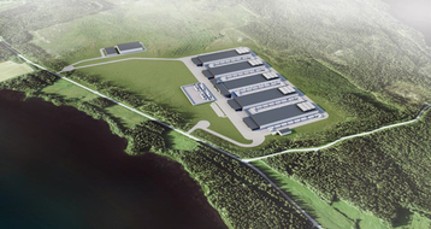
Chiplet startup Baya Systems announces $36m Series B funding round
Chiplet technology startup Baya Systems has raised more than $36 million in a Series B funding round.
The company, which develops system-on-chip (SoC) and chiplet systems, said it would use the funding to support operational growth and accelerate the development and deployment of its technology.
Growing AI workloads are driving the need for system-on-chip designs - a single chip containing compute components - to evolve into a chiplet-type design which Baya refers to as a system-of-chip, or a collection of chips that work together.
Baya Systems says that by using chiplets, it can better support AI and compute-heavy applications by offering scalable performance, optimized power, and reduced costs, when compared to more traditional approaches.
Founded in March 2023 by Kumar, Dr. Eric Norige, and Joji Philip, the company emerged from stealth in June 2024. It already has a number of partnerships, including with Tenstorrent, which licenses Baya technology for its AI and RISC-V chiplet solutions. Tenstorrent CEO Jim Keller sits on Baya Systems' board of directors.
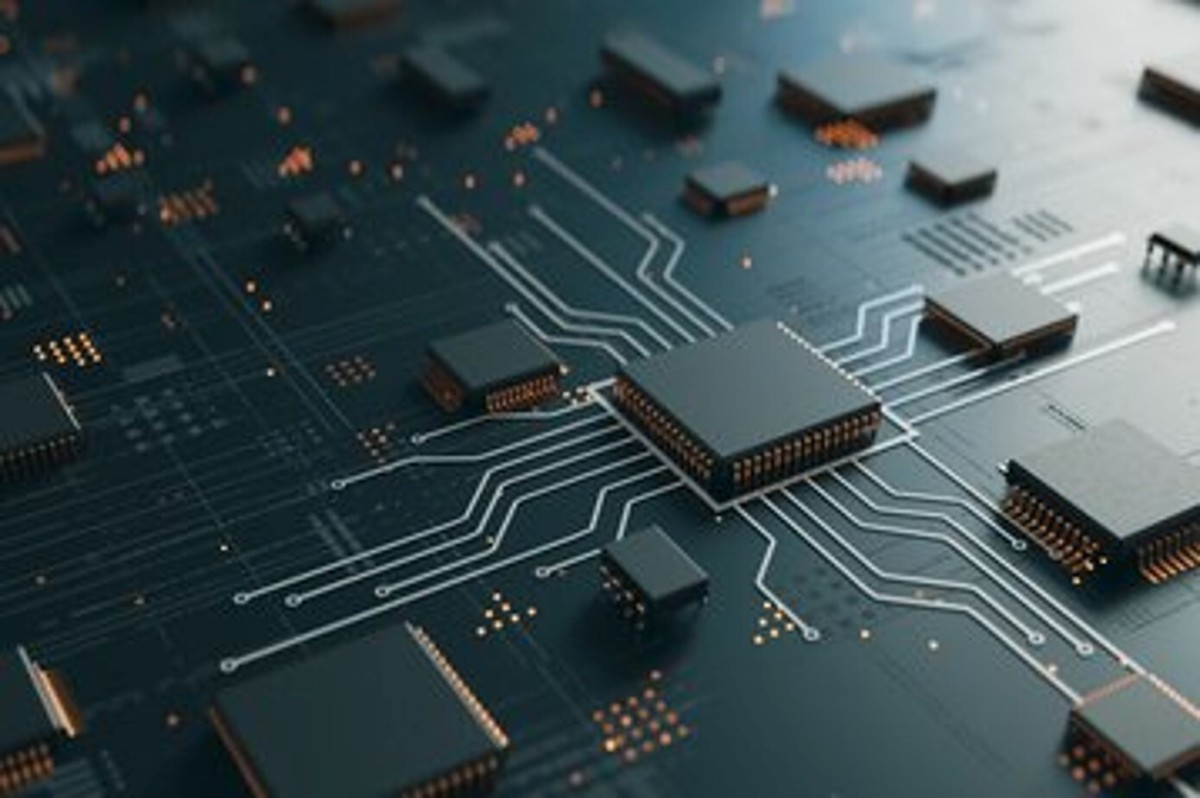
Sify Technologies to invest $5bn in Indian AI data center expansion
Sify Technologies has announced it will invest $5 billion in expanding its data centers and integrating artificial intelligence operations in India.
As announced in a recent LinkedIn post, the company plans to build smaller AI inference facilities across 20 secondary markets in India.
The ICT solutions provider launched a GPU cloud offering in October last year. Its CloudInfinit+AI solution gives users access to GPUs on a pay-as-you-go-basis.The GPUs are likely from Nvidia following the announcement in September 2024 that Sify would become a Nvidia colocation partner.
In June 2023, Kotak Data Center Fund said it would invest up to Rs 6 billion ($73m) in compulsory convertible debentures of Sify Technologies’ data center unit. The funds were said to be for data center expansion across India and as an investment into renewable energy.
Sify Technologies’ data center business is headed up by Sharad Agarwal, who has been CEO since August 2024.

Leave A Reply
LOGO
This stunning beach house property is a true oasis, nestled in a serene coastal community with direct access to the beach.
Opening Hours
Monday - Friday : 9AM to 5PM
Sunday: Closed
Closed during holidays
Contact
+18888888888
hezuo@eyingbao.com123 West Street, Melbourne Victoria 3000 Australia



